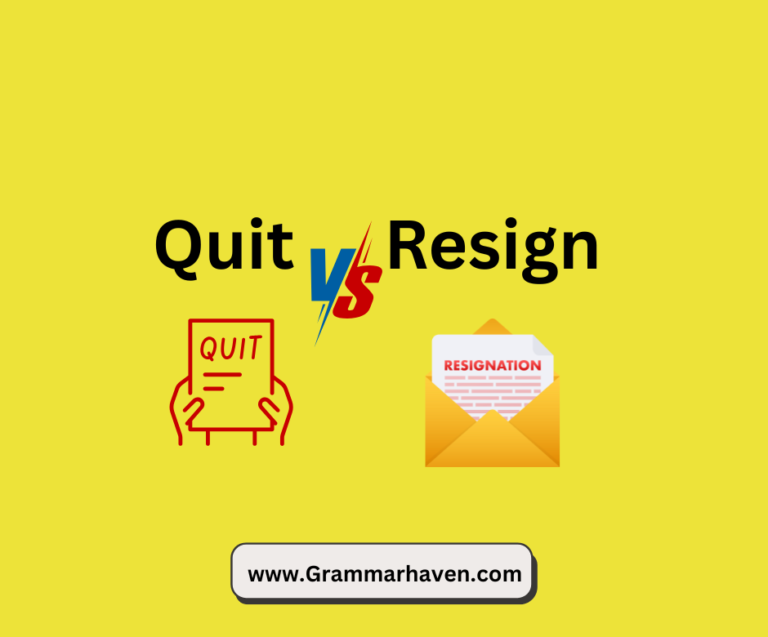Pick-Up, Pickup or Pick Up : What’s the Correct Usage?
There can be confusion spelling even simple words as “ pickup or pick up .” One might think that these two spellings are similar because of phonetic similarity , but serve different purposes. “Pick up” is a verb phrase used to describe actions like gathering or retrieving. “Pickup” is a noun referring to either the act of collecting or a type of vehicle designed for transporting goods. “Pick-up” (hyphenated) is a less common form used in specific contexts, such as scheduled collections.
Using the proper term pickup vs pick up is crucial for effective communication and reinforcement of your credibility as a writer .This article will make you able to differentiate between pick-up, pick up, and pickup to help you use them correctly every time.
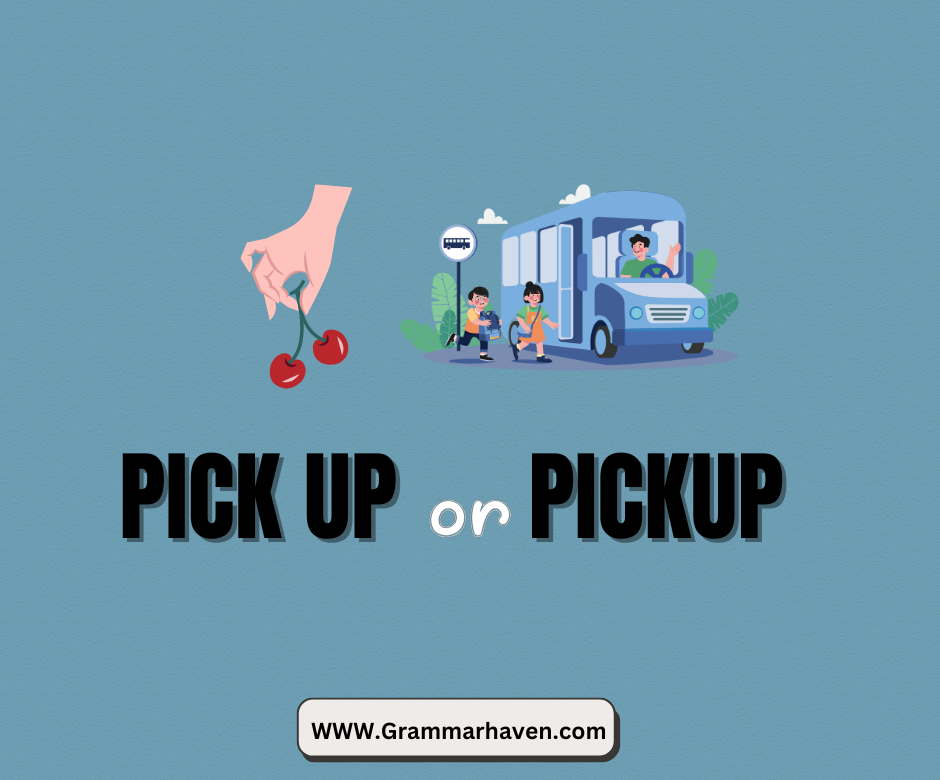
Why is There Confusion?
The cause of confusion between pickup or pick up and pick-up is their visual and phonetic similarities. Each form serves a distinct grammatical function in English. Pick up works as a verb phrase, pickup functions primarily as a noun, and pick-up represents a hyphenated alternative sometimes used in place of the noun form( pickup) .Many people end up mixing these terms because they’re so closely related in meaning and spelling.
Quick Summary
Pickup and pick up have separate uses in English. Pick up is a verb phrase describing actions such as gathering, lifting, or retrieving objects or people. Pickup is a noun referring to either the act of collecting something or a type of vehicle designed for transporting goods. Pick-up (with a hyphen) is a less common form typically used in specific contexts like scheduled collections or as an adjective.
What is a “Pick-Up”?(Adjective Usage Explained)
A pick-up (with a hyphen) typically functions as a noun. It generally refers to an action or event involving collection or gathering, such as a scheduled pick-up of packages or passengers. For example, “Your furniture will be ready for pick-up on Thursday.” While current writing trends favor the unhyphenated form “pickup” is favored in modern writing trends , you might still encounter “pick-up” in older publications or specific style guides. Essentially, it is used as an alternative spelling of the noun for the writers and editors .
The hyphenated “pick-up” is used as an adjective to describe a noun.
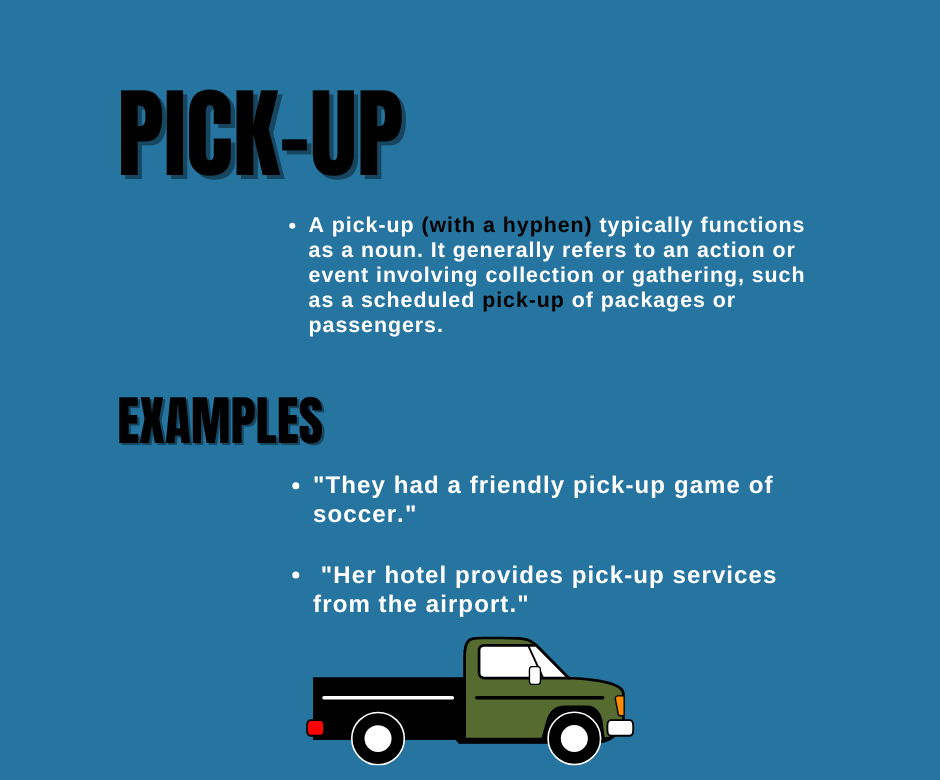
Examples of Correct Usage:
“They had a friendly pick-up game of soccer.” (Describes the game)
“Her hotel provides pick-up services from the airport.” (Describes the service)
When to Use the Hyphen:
Use a hyphen when “pick-up” is modifying another word (e.g., “pick-up basketball,” “pick-up line”).
Common Mistakes:
Incorrect: “She will arrange a pickup service for you.”
Correct: “She will arrange a pick-up service for you.”
Grammar Tip: If the phrase acts like an adjective, use a hyphen.
What Does the Word “Pick Up” Mean?
Pick up (with a space) is a two-word verb phrase combining “pick” and “up.” When used together, it describes the action of lifting, collecting, or gathering something or someone. You might pick up groceries from the store or pick up a friend from the train station. This form always functions as a verb indicating an action being performed. Pick up can also mean to resume something (“Let’s pick up where we left off”), to learn or acquire (“She quickly picked up Spanish”), or to improve (“Business has picked up since spring”). In all instances, pick up refers to performing an action rather than naming a thing.
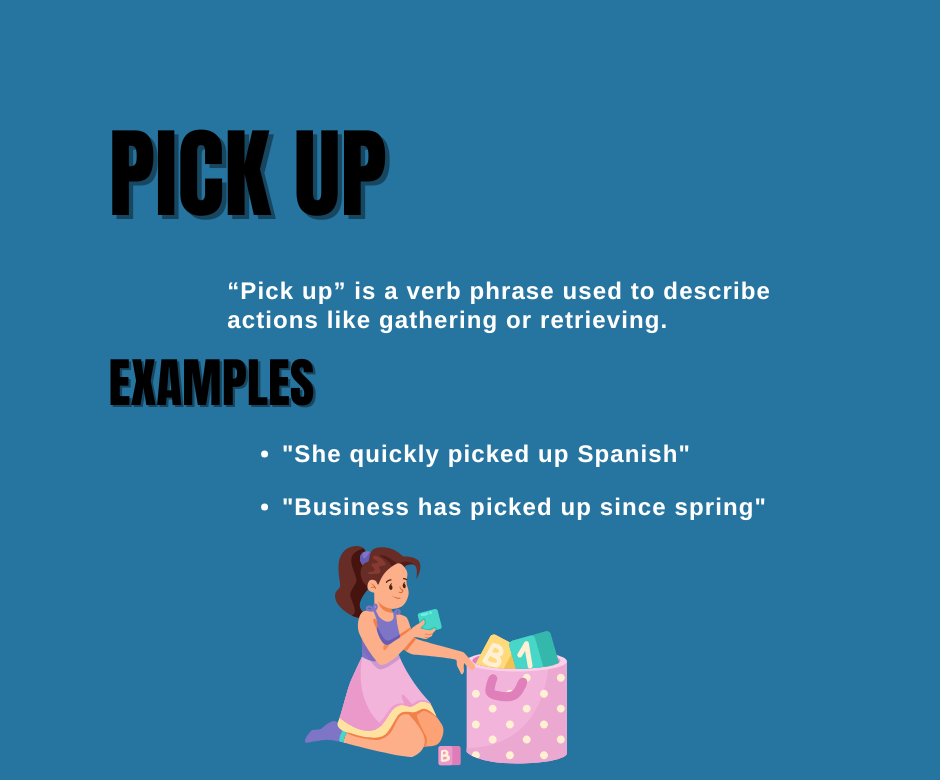
What is a “Pickup”? pickup or pick up
Definition and Meaning of Pickup
Pickup (without spaces or hyphens) primarily serves as a noun with several meanings. It commonly refers to the act of collecting something, as in “The pickup of the materials is scheduled for tomorrow.” It also famously identifies a type of vehicle – the pickup truck. Pickup can indicate an improvement or increase in activity, such as “There’s been a pickup in customer traffic this month.”
Different Meanings of ‘Pickup’
Vehicle (Pickup Truck)
- “He just bought a brand-new pickup.”
Collection (Retrieving Something)
- “The store offers curbside pickup for online orders.”
- “There will be a trash pickup tomorrow morning.”
Improvement (An Increase in Something)
- “There has been a pickup in sales this quarter.”
Source: Merriam-Webster
Common Mistakes to Avoid:
Incorrect: “She just got a new pick up.” (Referring to a vehicle)
Correct: “She just got a new pickup.”
Grammar Tip: If you can replace “pickup” with “collection” or “increase”, it should be one word.
Pickup Or pick up Truck
A pickup truck is a versatile vehicle featuring an open cargo area (bed) at the rear, connected to an enclosed cab where the driver and passengers sit. These vehicles are designed for transporting goods, equipment, and materials.
What is the use of a Pickup Truck ?
Pickup trucks are useful vehicles because they are strong, can carry heavy loads, and drive well on rough roads. A pickup truck with an open cargo area (bed) at the back and a closed cabin in the front where the driver and passengers sit. It is designed to carry goods, tools, and other heavy items. A pickup truck and a trailer go hand in hand, especially for those who need extra hauling capacity. They are used for work, like construction, and for personal activities, like camping. Their practicality makes them a popular choice in many places.
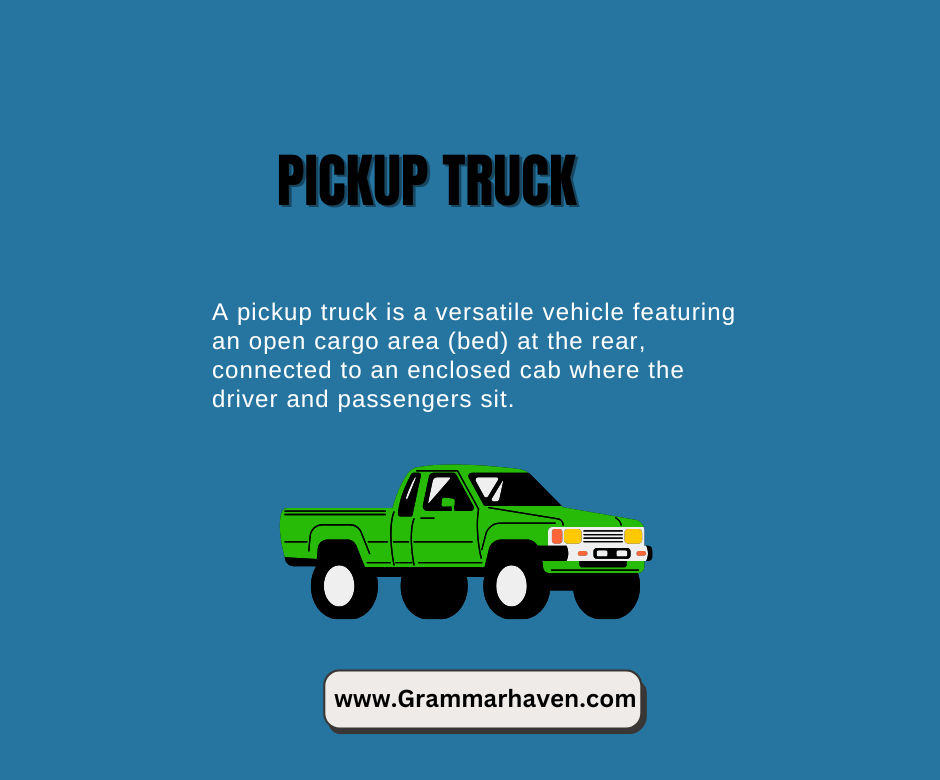
Pickup or Pick-up food ?
The correct choice depends on how you’re using it in a sentence:
- “Pick up food” (verb) → If you’re talking about the action of collecting food.
Example: “I need to pick up food from the restaurant.” - “Pick-up food” (adjective) → If you’re describing food that is meant for takeout.
Example: “The restaurant has a pick-up food option.” (Less common, usually “pick-up order” is preferred instead.) - “Pickup food” (noun) → Incorrect in most cases. “Pickup” is a noun, but it doesn’t directly modify “food.” Instead, you would say “pickup order” or “pickup service.”
Best Choice: Use “pick up food” unless you’re modifying another noun (e.g., “pick-up order”).
Which One Should You Use?
Choosing between pick up, pickup, and pick-up comes down to how you’re using the term in a sentence. For actions, always use pick up as a verb, as in “I need to pick up my prescription.” For the noun form, when referring to an object, event, or vehicle, use pickup, as in “The pickup is scheduled for tomorrow afternoon” or “He drives a red pickup.” While pick-up (with a hyphen) remains acceptable in certain contexts and style guides, the trend in modern English favors pickup (no hyphen) as the standard noun form. To summarize: use pick up for actions and pickup for things or events.
Regional & Cultural Differences in ‘Pick Up’ vs. ‘Pickup’ Usage
The spelling and usage of “pickup” vs. “pick up” varies by country.
American English vs. British English
- American English: Prefers “pickup” (noun) without a hyphen.
- British English: More likely to use “pick-up” in some cases.
Example:
- US: “He scheduled a pickup at the dry cleaners.”
- UK: “He scheduled a pick-up at the dry cleaners.”
Other International Variations
- Australia & Canada: Follows American English but retains some British influence.
- India & South Asia: “Pick-up” is more common due to British English legacy.
Pick Up, Pickup, or Pick-Up in Different Writing Styles
Different writing styles (formal, academic, journalistic, casual, and business) handle “pick up,” “pickup,” and “pick-up” differently.
1. Formal Writing (Essays, Reports, Business Documents)
- Stick to clear, structured grammar.
- Example: “Their company will initiate a pickup schedule for customer orders.”
2. Journalistic & News Writing (AP Stylebook Rules)
- News outlets often use “pickup” as a noun but avoid hyphenation.
- Example: “ Our company’s authorities announced an increase in package pickup services.”
3. Casual & Conversational Writing (Blogs, Social Media, Emails)
- More flexibility in grammar.
- Example: “Can you pick up some snacks on your way home?”
4. Business & Marketing Writing
- Avoid unnecessary complexity—clarity is key.
- Example: “Our online store offers free curbside pickup.”
Note : Adjust your usage depending on the tone and medium of your writing.
Psychological & Marketing Impact of ‘Pick Up’ vs. ‘Pickup’ in Branding & Advertising
Did you know that choosing the right form of “pickup” vs. “pick up” can impact marketing success?
How Brands Use These Words
- Retail & Ecommerce: “Free pickup on all orders over $50!”
- Ride-Sharing & Delivery Apps: “Book your pick-up now.
- Automotive Industry: “The new Ford pickup is here.”
Psychology Behind Word Choice
- “Pickup” feels faster and more instant (perfect for e-commerce).
- “Pick up” creates a sense of action (better for CTA buttons).
Pro Marketing Tip: A/B test your email subject lines using “pickup” vs. “pick up” and see which performs better.
Examples in Context
- She will pick up the package from the courier’s office.
- The pickup time for the car service is set for 6 PM.
- Please ensure the pick-up of the dry cleaning is done before 5 PM.
- The delivery truck is a pickup model that can handle large shipments.
- She asked her neighbor to pick up her mail while she was away.
- The pick-up location for the airport shuttle is at the front of the terminal.
- They offer a free pickup service for all online orders over $50.
- She needs to pick up her rental car at the downtown office.
- The pick-up of the new office chairs is scheduled for this afternoon.
- The pickup truck was loaded with supplies for the construction site.
- Can you pick up the pizza on your way home?
- The pick-up for the recycling bins happens every Tuesday.
- She prefers to use a pickup truck for off-road adventures.
- The service will pick up your old electronics for recycling.
- The pick-up of the auction items will require a large vehicle.
- The pickup will arrive at your address between 4 and 6 PM.
In these examples, pick up works as a verb phrase describing the action of collecting or gathering, such as “I need to pick up my groceries.” Pickup functions as a noun referring to the act of collection or a type of vehicle, like “The pickup for the donation items will be on Friday.”
Pick-up (hyphenated) also serves as a noun but appears less frequently in contemporary writing, as seen in “We had a scheduled pick-up for the auction items.” These examples highlight the distinct roles and proper usage of each term in everyday communication.
Synonyms and Similar Terms to “Pickup” or “Pick-up” and “Pick Up”
Synonyms and Similar Terms for “Pickup” or “Pick-Up”
- Collection
Collection refers to the act of gathering items or people, similar to how pickup is used. For instance, “The collection of donations will be on Saturday.” - Retrieval
Retrieval involves getting something back or collecting it. This can be used in contexts like “The retrieval of the package is scheduled for 3 PM.” - Acquisition
Acquisition denotes the act of gaining possession of something. For example, “The acquisition of the new equipment will be handled by the logistics team.” - Drop-Off
Drop-off is sometimes used in contrast to pickup when referring to the act of delivering items. For instance, “Please schedule a drop-off for the completed documents.” - Fetching
Fetching can be used similarly to pick up when describing the action of going to get something. For example, “He’s fetching the kids from school.”
Synonyms and Similar Terms for “Pick Up”
- Collect
Collect directly substitutes for pick up when referring to gathering items or people. For example, “I need to collect my dry cleaning.” - Gather
Gather suggests bringing things or people together. For instance, “We will gather the supplies before the event.” - Retrieve
Retrieve works well when talking about getting something back. For example, “I need to retrieve my documents from the office.” - Acquire
Acquire indicates obtaining something, often used in broader contexts. For example, “She will acquire new skills during the training.” - Fetch
Fetch resembles pick up when it comes to going to get something. For example, “Can you fetch the mail from the mailbox?”
Origins of “Pickup” or “Pick-up” and “Pick Up”
Origins of “Pickup” or “Pick-Up”
1848: The term “pickup” or “pick-up” originally meant “that which is picked up. “Early Meaning: Described the act of collecting or gathering.1882: Specifically referred to the action of picking up.1859: The adjective form (meaning “immediately available”) came into use. 1937: The term “pickup truck” emerged, derived from Ford’s 1936 model. Vehicle Naming: The name reflects its function of picking up and delivering goods. 20th Century Expansion: Used in casual games, acceleration, and recovery.
Origins of “Pick Up”
Origins (14th century): “Pick up” comes from combining pick (to lift or pluck) and up (indicating direction or completion). Early Meaning: Initially used to describe lifting something with fingers. 1510s: Evolved to mean casually obtaining or procuring something. 1690s: Used to describe picking up people into vehicles or vessels. 1741: Gained the meaning of “improving gradually.” 1861: Used in the sense of “tidy up.” 1867: Used to refer to a “stimulating alcoholic drink.” 1922: Acquired the meaning of “gain speed.” 1945: Started being used to mean “pay.” Overall Evolution: The phrase “pick up” has developed multiple meanings across different contexts and time periods.
Conclusion
The difference between pickup, pick up, and pick-up has been made clear in this guide and will help you to avoid common writing mistakes. Pick up functions as a verb phrase for actions like gathering, retrieving, or improving. Pickup as a noun refers to acts of collecting or a type of vehicle. Pick-up (hyphenated) is a less common noun form used in specific contexts like scheduled collections. By remembering the difference and applying these distinctions consistently in your writing, you’ll be able to communicate more clearly and professionally in both casual and formal settings.
Pick Up or Pickup? Quiz
Let’s test what you’ve learned with a fun grammar quiz!
Fill in the Blanks:
- Can you ______ (pick up / pickup) some coffee on the way home?
- The restaurant offers curbside ______ (pick up / pickup).
- I got a brand-new Ford ______ (pick up / pickup).
- We had a casual ______ (pick up / pickup) basketball game.
Answer Key:
- pick up
- pickup
- pickup
- pick-up
FAQs
Q: Is “pickup” one word or two?
It’s one word when used as a noun. It’s two words when used as a verb.
Q: Can “pick-up” be used as a noun?
No, “pick-up” is only used as an adjective (e.g., “pick-up game”).
Which is correct, pickup or pick up?
Both are correct! “Pickup” is the noun form, while “pick up” is the verb phrase when you’re taking action.
Are pick up and drop off hyphenated?
As verbs, no. When they’re adjectives before nouns, yes—like “pick-up location” or “drop-off point.”
What is a pickup?
A pickup is either a vehicle with an open cargo area or the act of collecting someone/something from a location.
How do you write pick up in a sentence?
“I’ll pick up the kids from school today.” The verb form uses two separate words.


